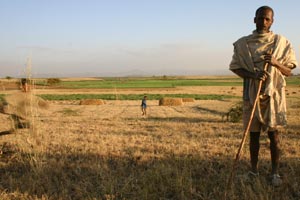Organic rays of hope in Ethiopia
 By the time I moved to Massachusetts in 1967, the state's agricultural economy was in free-fall. There were less than 6,000 farms at the time -- down from 35,000 at the beginning of World War II. Farmland acreage had plummeted from 2,000,000 to around 700,000. Meanwhile, 85% of the food consumed was imported and we were paying about 10% above the national average for it.
By the time I moved to Massachusetts in 1967, the state's agricultural economy was in free-fall. There were less than 6,000 farms at the time -- down from 35,000 at the beginning of World War II. Farmland acreage had plummeted from 2,000,000 to around 700,000. Meanwhile, 85% of the food consumed was imported and we were paying about 10% above the national average for it.In 1976 under the leadership of Governor Michael Dukakis and Food and Agriculture Commissioner Fred Winthrop the state developed a policy that included strategies designed to halt, and possibly reverse, the decline of our agricultural base. One key strategy was to increase the direct marketing options for farmers -- including the establishment of urban farmers' markets.
A special effort was made to set up markets in low-income communities where residents had little access to fresh local produce. John and Gordon Bemis owners of the 30-acre Hutchins Farm in Concord, Massachusetts sold at one of these low-income markets in the South End section of Boston where I served as market master. Hutchins was one of the largest organic farms in the state. However, after a couple of weeks selling at the South End market the Bemis brothers told me that they would not be advertising that fact there. The reason? A number of potential customers told them they were disgusted by the thought of corn and other vegetables being grown in cow poop.
Attitudes toward organics changed dramatically as the public became more informed about conventional farming's dependence on toxic chemicals. Organic farming became one of the fastest growing segments of U.S. agriculture during the 1990's. In 2005, for the first time, all 50 States in the U.S. had some certified organic farmland.(GW)
Organic farming "improving Ethiopian yields"
by Lim Li Ching
People and Planet
January 11, 2007
Organic farming and sustainable agriculture practices in Ethiopia have brought about significant benefits to poor farmers and communities, according to the country's top environment official.
A ten-year experimental project co-organised by an Ethiopian NGO and the government's agriculture bureau has shown that farms using organic compost are producing higher yields, sometimes double, compared with those using chemical fertilisers, according to Dr Tewolde Berhan Gebre Egziabher, Director-General of the country's Environmental Protection Authority.
Speaking last October at the Food and Agriculture Organisation (FAO) meeting marking the tenth anniversary of the World Food Summit Tewolde said that the impacts of organic farming on farm incomes have also been positive. The farmers have been able to get out of the debt they used to incur from buying chemical fertilisers, and they are obtaining better economic returns because of the higher yields.
He said the project, involving 42 communities, is now spreading to other parts of the country, with the government using its methods as a major means to combat land degradation and poverty.
Depressing data
The evidence of progress in sustainable agriculture in Ethiopia was a ray of hope amid depressing data in the FAO's 2006 report on The State of Food Insecurity in the World or SOFI. This says that, at present, the number of hungry people in the world is increasing, at a rate of four million a year.
Ten years after the 1996 World Food Summit (WFS), which promised to reduce the number of undernourished people by half by 2015, there are more hungry people in the developing countries today - 820 million - than there were in 1996. The report said there are still 854 million hungry people worldwide, including 25 million in the transition countries and 9 million in the industrialised countries.
Dr Tewolde described the results of the experimental project in Tigray region of Ethiopia. This is is a highly degraded region, with low agricultural production, high food insecurity and rural poverty. In this terrain, a farmer-led project has been undertaken, facilitated by the Institute for Sustainable Development (ISD) in cooperation with the Ethiopian Bureau of Agriculture and Rural Development.
The project has promoted composting, water and soil conservation activities, and crop diversification. It also supports poor women-headed families, provides skill training for unemployed girls, supplies seeds and seedlings for nurseries and farmers, facilitates exchange visits, and supports the use of simple and accessible technologies such as treadle pumps.
Significant benefits have accrued to poor farmers, particularly to women-headed families, said Dr Tewolde. The gains include increased yields and productivity of crops, improved hydrology with raised water tables and permanent springs, improved soil fertility, fewer weeds, pests and diseases, rehabilitation of degraded lands and increased incomes.
In particular, farmers quickly saw the impact of compost on crop yields and the improved water regime of their fields.
By 1998, two years after the start of the project, the farms using compost gave similar yield increases as chemical fertilisers. Data for 2002, 2003 and 2004 showed that on average, composted fields gave higher yields, sometimes double, than those treated with chemical fertilisers.
The farmers also found that the positive effects of compost can remain for up to four years. In contrast to chemical fertilisers, compost does not need to be applied every year. Compost also helps increase the moisture retention capacity of the soil. This is crucial in times of drought, which remains a problem in many parts of Ethiopia.
The farmers' incomes improved, as they are obtaining higher yields from organic farming, while they save from no longer buying chemical fertilizers and thus they have reduced their debts.
Local communities have also been empowered, through the development of legally recognised by-laws to talke control overy their land and other natural resource. Local committees have been established to oversee and manage the project.
Successful package
By 2005, the ISD and the Bureau of Agriculture and Rural Development were working together on the project in 42 communities, while the Bureau was promoting the 'sustainable agriculture package' of compost-making, together with trench-bunding (to harvest soil and water) and planting multipurpose trees throughout the region.
The success of the project has also led to its expansion to include many more communities in other parts of the country. The Ethiopian government has now adopted the approach used by the project as its main strategy for combating land degradation and poverty.
The FAO SOFI report recognises that there is a need to enhance the productivity of smallholder agriculture. Because most poor farmers cannot afford external inputs, the principles and approach of the Ethiopian project is proving to be a successful approach towards food security.
If concerted efforts such as these are not made, the 10-year WFS pledge to halve the number of hungry people by 2015 remains in jeopardy.
Source: Third World Network Features
Lim Li Ching is a researcher with Third World Network based in Kuala Lumpur, Malaysia. This article is reproduced from the South-North Development Monitor (Number 6134), on 6 November 2006.


0 Comments:
Post a Comment
<< Home